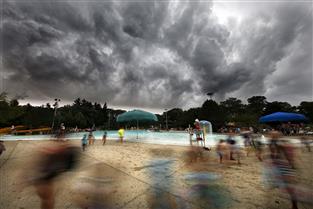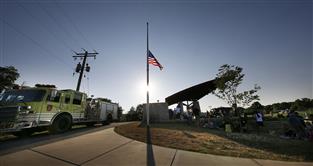Wisconsin Lutheran neighbors fight college's rezoning efforts
Some say promises made in past were broken
Administrators at Wisconsin Lutheran College are trying to reach out to residents in the neighborhoods around the school as it seeks to win approval of a rezoning of houses that it owns.
But some residents are skeptical of the college's long-range plans, in spite of its assurances. Many are long-term residents with years of experience with the college that has made them wary.
At a July meeting, Plan Commission members, faced with 16 residents opposed to the rezoning, and a petition signed by 38 also in opposition, put off the college's request, and asked it to return with more detailed plans and a clearer picture of its future. The college plans to return to the commission Sept. 10.
Dealing with growth
The 11 houses, all purchased by the college in a mediation process, are on the east side of the school, west of Pleasant View Street, a perimeter reached in agreement with the city.
While there's no waiting list for campus housing, the school is growing rapidly, said Jason Van Acker, executive director of marketing and communications. But much of that growth is in its adult and online programming - which don't require housing.
Under the current residential zoning, the college may house no more than four unrelated adults in a single home. With a change to institutional zoning, the college could go beyond that. Van Acker said the change would allow the school to add 40 beds for students.
Institutional zoning could make it possible for the college to raze the homes and build dormitories, which residents say would destroy the character of their neighborhood, but Van Acker said the college would not build on the sites.
"We would be upgrading those properties … but the homes are not going anywhere," he said. One of the 11 houses would be used as an office.
"We have no intent of growing to the east," which is in Wauwatosa, he said. Any growth the college may plan would only be on the west side of the college, which is in Milwaukee.
Wary of promises
The college has sent a series of three letters to as many as 200 homes in the area, answering questions, announcing campus events and inviting residents to a community listening session held in August that drew about a dozen people, said Jason Van Acker, executive director of marketing and communications.
Another college initiative was to invite the Ravenswood and Glenview Heights neighborhood associations to appoint representatives to serve on a citizen's advisory board to work with the college on this and ongoing issues. The board has not yet been created.
Linda Polulach, who lives near the college on Wisconsin Avenue, praised the school's letters, and said they should have been communicating that way much earlier. But, still, she opposes the rezoning.
"My objection is I've been living here since 1979, so I've followed the entire course of events that has happened with expansion of the college and promises that were made and not followed, like 'This is the end ... we're not going to expand any further east,' and then, following five, six , seven, eight, nine, 10 years, their situation changes."
The college moved to its current location in 1978. At the time the site was a loose collection of connected buildings and lots of green space. Today, red brick buildings dominate the block and adjacent property.
"They're a quality institution, but they're a Christian institution, so you would expect them to be a good neighbor," said John Randall, a neighbor of the college. "And the whole problem is they have an institution that has grown well beyond what they originally said, that they never were going to have more than 600 students. And they now have … more than a thousand."
Hard to control future
For Randall, even expansion into Milwaukee is a problem, as it will drive up traffic, increase the demand for parking and create other problems.
Gary Schmid, the college's vice president of finance, pointed out that if it's granted institutional zoning for the houses, the college will still have to return to the city for approval of any building plans, which, presumably, would be a safeguard for residents.
"They would come before the city in terms of design, but not in terms of doing it," Randall said.
Mayor Kathy Ehley said the city would be "hard-pressed to say no" to a proposal that fits the zoning of a site. "It doesn't have to say yes, but it makes it more difficult to say no. That's the reality of it.
"The concerns of the neighbors of wanting to know what the future plans are for the campus are justified."
Randall suggested a compromise might be reached by granting the school an exception to the number of unrelated-adults rule, without rezoning the properties.
Ehley said she was not aware of any precedent.
"This has been morphing over the past 20 years or so, and that's what concerns the neighbors," she said.
More from News and Features
- Anodyne Coffee plans to open location in Wauwatosa Village
- Wauwatosa Meetings: Aug. 4
- Video: Wauwatosa girl's curbside ice cream stand raises money for the hungry
- Wauwatosa News and Notes: Hands-only CPR training offered; Firefly Art Fair is Aug. 6-7
- Wauwatosa Ask Now: Why are there barriers and fencing along the North Avenue bridges over the Menomonee River?
- Mystery Photo Contest: July 28
- Wauwatosa gears up for National Night Out event, this year at the zoo
- Election 2016: Wisconsin's 4th District candidates weigh in
- Wauwatosa's Luther Manor residents share smiles through flower delivery
- Wauwatosa Police Report: July 17-23















